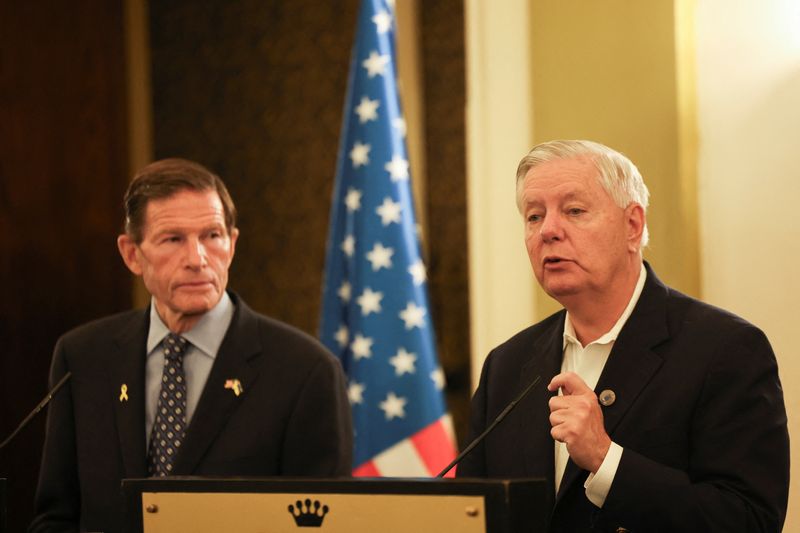Prominent U.S. Republican Senator Lindsey Graham has recently urged Saudi Arabia and Israel to forge diplomatic relations by the end of the year, cautioning that the forthcoming U.S. administration may struggle to garner enough support for such a deal. The Biden administration has been advocating for a normalization agreement between Riyadh and Jerusalem, which would come alongside U.S. security guarantees for Saudi Arabia, indicative of a broader diplomatic push in the region. Graham emphasized the urgency of seizing the current opportunity, asserting that a majority in the Senate for a robust defense treaty—akin to existing agreements with Japan and Australia—will be harder to achieve under future leadership. The senator’s comments reflect his significant influence in Congress and his alignment with the Republican Party’s foreign policy stances, particularly concerning Israel and the Middle East.
During his recent trip to the region, Graham met with Israeli Prime Minister Benjamin Netanyahu and expressed his intention to discuss normalization efforts with Crown Prince Mohammed bin Salman of Saudi Arabia and President Sheikh Mohammed bin Zayed Al Nahyan of the UAE. Saudi leaders have shown interest in formal ties with Israel, but there are stipulations attached, notably the need for a pathway to a Palestinian state—a sentiment complicated by recent conflicts, particularly the escalation following the October 2023 attack by Hamas on Israel. Normalizing relations between Israel and Saudi Arabia could catalyze similar actions from other Arab and Muslim-majority nations, establishing a new foundation for regional stability, given Saudi Arabia’s influence and status as the custodian of Islam’s holiest sites.
However, the potential for the two-state solution, which envisions an independent Palestinian state alongside Israel, faces severe challenges, exacerbated by ongoing violence. Graham has stated that the prospect of a two-state solution is now “dead,” particularly following the violent Hamas assault that resulted in significant loss of life in Israel. He acknowledged that the Israeli public, traumatized by the attacks, would resist any initiative that appears to reward terrorism with territorial concessions. Instead, he posited that Israel could collaborate with Saudi Arabia and the UAE to address Palestinian concerns, although the feasibility of such cooperation remains in question amid heightened tensions.
The backdrop of the escalating conflict post-Hamas’ attacks has drastically shifted the political landscape in Israel. Netanyahu’s government has historically been less supportive of the two-state framework, dismissing it as a viable solution even before the recent violence. In the face of rising casualties in Gaza, where over 41,000 Palestinian lives have reportedly been lost due to Israeli military responses, the rhetoric of reconciliation has taken on a more somber tone. Saudi Arabia’s position is increasingly critical, as it calls for an end to the violence while positing that a sustainable resolution to the Palestinian issue is essential for regional security.
Netanyahu, for his part, views the establishment of formal ties with Saudi Arabia as a potential pathway to broader peace and integration within the Arab world, aligning with visions of a reconciliation between Islam and Judaism that could redefine long-standing hostilities. Israel has managed to achieve diplomatic relations with a handful of Arab states, including Egypt and the UAE, yet the core of the Palestinian issue remains a significant roadblock. The expansion of Israeli settlements in the West Bank complicates the territorial negotiations further, making it increasingly challenging to envision a Palestinian state that satisfies both parties’ aspirations.
In sum, Graham’s call for swift normalization between Israel and Saudi Arabia reflects broader geopolitical ambitions amid a fraught regional context. With the Biden administration’s term winding down, the urgency of this diplomatic effort is paramount. However, the intertwined fates of ongoing conflict and stalled negotiations pose immense obstacles, particularly regarding the viability of the two-state solution that has now seemingly fallen victim to historical dynamics of violence and distrust. As Graham prepares for high-profile discussions in the region, the world watches closely, aware that the outcomes of such meetings could have long-lasting implications for peace and stability in the Middle East.

